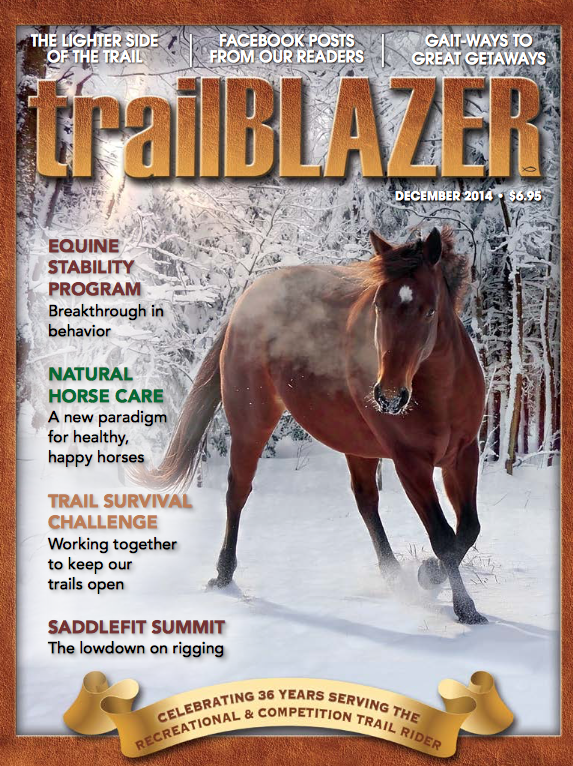 Now that we’re in the middle of winter and looking forward to spring, and returning to the trails, let’s discuss for a moment how we can work together to keep our legacy of equine trails open, not only for us but for future generations. Over the course of the past year a number of readers have sent in their concerns about access to the wonderful trail systems that we enjoy from coast to coast. Let’s see what we can do to address their questions.
Now that we’re in the middle of winter and looking forward to spring, and returning to the trails, let’s discuss for a moment how we can work together to keep our legacy of equine trails open, not only for us but for future generations. Over the course of the past year a number of readers have sent in their concerns about access to the wonderful trail systems that we enjoy from coast to coast. Let’s see what we can do to address their questions.
Back in August of 2014 I had the privilege and honor to be invited to the Pennsylvania Quarter Horse Association’s Benezette ride in the Elk country of PA. It was wonderful. The Area. The Ride. The Organizers. I can’t say enough about the event. One of the most memorable happenings of the gala was meeting Bud and Gwen Wills. If you haven’t heard of this dynamo couple they are the go-getters behind the Pennsylvania Equine Council’s Trail Stewardship Program and the Ride Smart program. These programs, designed to help foster sustainable trail use and communications between the horse community and the various land managers are the best that I’ve encountered. I hope they spread further afield.
 Graduates of the prestigious U.S. Forest Service Master LNT course both Bud and Gwen Wills have been involved with horses, and mules for decades in both show rings and on the trails. After becoming concerned about the loss of public land access to equine users across the country, Bud and Gwen got involved with the Pennsylvania Equine Council (PEC); a volunteer organization that represents equine owners in Pennsylvania. Bud serves as the State Trail Chair for the PEC, and Gwen as the Trail Stewardship Program Director. Together they are educating trail riders throughout Pennsylvania to become better trail citizens.
Graduates of the prestigious U.S. Forest Service Master LNT course both Bud and Gwen Wills have been involved with horses, and mules for decades in both show rings and on the trails. After becoming concerned about the loss of public land access to equine users across the country, Bud and Gwen got involved with the Pennsylvania Equine Council (PEC); a volunteer organization that represents equine owners in Pennsylvania. Bud serves as the State Trail Chair for the PEC, and Gwen as the Trail Stewardship Program Director. Together they are educating trail riders throughout Pennsylvania to become better trail citizens.
Through the PEC Bud & Gwen have developed several Trail Stewardship Programs that have been accepted by State and Federal agencies as a means of keeping recreation lands open to equine use. These courses are conducted throughout Pennsylvania and feature instruction in trail layout, construction and best management practices. The Wills also organize pack clinics that teach volunteers how to safely move tools and construction materials for trail work while they’re assisting public agencies and creating opportunities for trail users.
If you’re interested learning more about LNT ethics and keeping trails open for equestrian use I’d recommend their Trail Stewardship Program in a heartbeat. Bud & Gwen host these classes throughout Pennsylvania and surrounding states. For more information visit http://pennsylvaniaequinecouncil.org/trails.php on the web.
Now that we’ve introduced our experts let’s jump into the questions that you’ve sent in and see what Bud and Gwen have to say.
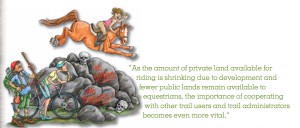 Horse riders made these trails but now we’re being kicked out in favor of bicycles and hikers. What can I do to stop it? Yours, Wants to Ride
Horse riders made these trails but now we’re being kicked out in favor of bicycles and hikers. What can I do to stop it? Yours, Wants to Ride
What a question and what a statement. This is a problem for horse riders from coast to coast and it seems that every time we open a paper we read more bad news about horses being excluded from a favorite trail system. But what can we do to preserve our access to the trails and stop being squeezed out of our favorite pastime?
- Block off the trails so bicycles can’t ride there
- Work with the land managers to find a workable solution
- Ride somewhere else
- I’ll ride where and when I want
Wow, some of those responses sounded like fighting words! And sometimes I must admit I feel fighting mad when I hear about trail restrictions. Let’s see what Bud and Gwen have to say about the issue and what words of wisdom they can spread.
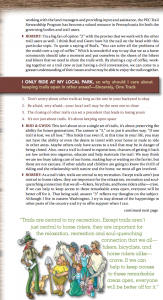 BUD & GWEN: Answer B is what we learned way back in Kindergarten; sharing, learning to get along and helping out are the best ways to preserve equine access. By taking the time and effort to learn how the various public and private lands are managed and being willing to work with land managers and other user groups is key to preserving our access. As the amount of private land available for riding is shrinking due to development and fewer public lands remain available to equestrians, the importance of cooperating with other trail users and trail administrators becomes even more vital.
BUD & GWEN: Answer B is what we learned way back in Kindergarten; sharing, learning to get along and helping out are the best ways to preserve equine access. By taking the time and effort to learn how the various public and private lands are managed and being willing to work with land managers and other user groups is key to preserving our access. As the amount of private land available for riding is shrinking due to development and fewer public lands remain available to equestrians, the importance of cooperating with other trail users and trail administrators becomes even more vital.
Public land managers have public meetings to ask for input from recreational user groups, environmental groups and others who see value in the land. By attending these meetings we learned quickly that most agencies don’t have the resources to address everyone’s wants or needs. Each agency has a very specific management plan and must adhere to a myriad of environmental laws and regulations like wetland protection, clean water/ clean streams and endangered species rules. By working with the land managers and providing input and assistance the PEC Trail Stewardship Program has become a valued resource in Pennsylvania for both the governing bodies and trail users.
RFE: I’m a big fan of option B with the proviso that we work with the other trail users as well. I’ve got to tell you I think Bud and Gwen have hit the nail on the head with this particular topic. To quote a saying of Bud’s “You can solve all the problems of the world over a cup of coffee.” Which is wonderful way to say that we as a horse community should take a moment and put ourselves in the shoes of the hikers and bikers that we need to share the trails with. By sharing a cup of coffee, or working together on a trail crew, or just having a civil conversation we can come to a greater understanding of their issues and we may well be able to enjoy the trails together.
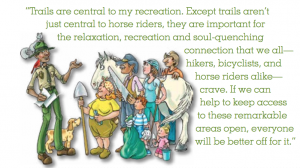 I only ride at my local park, why do I care about keeping trails open in other areas? Sincerely, One Track
I only ride at my local park, why do I care about keeping trails open in other areas? Sincerely, One Track
- Don’t worry about other trails, as long as the one in your backyard is okay.
- Be afraid, very afraid – your local trail may be next to close.
- The closing of other trails can set a precedence that leads to losing yours.
- It’s not just about trails. It’s about keeping open space.
BUD & GWEN: This isn’t about us or a single set of trails, it’s about preserving the ability for future generations. The answer is C or to put it another way “If one trail is lost, we all lose.” Although at this time in your life you may not have the ability or even the desire to travel with your horse or mule to ride in other areas. Maybe others only have access to that trail that may be in danger of being closed. Also, once a trail is closed to equestrians’ chances of getting it back is low unless you organize, educate yourselves about the issues, best management practices for sustainable trails and become a group who will help maintain the trail is corporation with the managers in charge of the land. We have reasons not to get involved, like we are too busy taking care of our horse, making hay or waiting for the farrier but they are not an excuse. If other adults and children are going to know the thrill of riding and the relationship with nature and the horse we must get involved.
RFE: As a trail rider, trails are central to my recreation. Except trails aren’t just central to horse riders, they are important for the relaxation, recreation and soul-quenching connection that we all; hikers, bicyclists, and horse riders alike, crave. If we can help to keep access to these remarkable areas open everyone will be better off for it. That being said answer C reflects my thoughts on the subject. Although I life in eastern Washington I try to stay abreast of the happenings in other parts of the country and try to offer what support I can when I can.
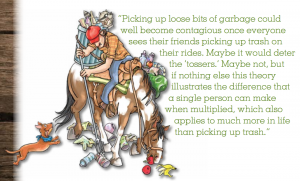 Every time I go trail riding I clean up the trailhead and tidy up the trail as well. Isn’t that enough? Truly, Cleaning Up
Every time I go trail riding I clean up the trailhead and tidy up the trail as well. Isn’t that enough? Truly, Cleaning Up
- Of course it is, parks have employees that are paid to clean the trails.
- It’s too hard to get on and off my mule on a trail ride.
- I pick everything I see on the trail to show other trail users that horse riders are good stewards.
- I pick up trash I find so that horse riders don’t get blamed for leaving it.
I’ll be the first to admit it. After a long day’s trail ride it is very easy to overlook that beer can alongside the trail or “not notice” the candy wrapper that escaped my horn bag and fell to the ground. As much as I try to do the right thing sometimes I slip and fall short of my goals. We all do. As long as we continually try to improve and to become that positive example to not just the horse world but to every other trail user I think that we’ll do all right. Let’s see what Bud and Gwen have to say!
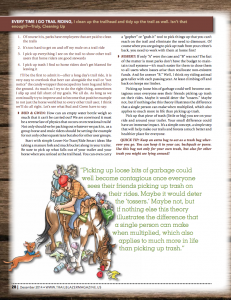 BUD & GWEN: How can an empty beer or pop can or water bottle weigh so much that it can’t be carried out? We are convinced it must be a reverse law of physics that occurs on recreational trails! Not only should we be packing out whatever we pack in, as a group horse and mule riders should be setting the example for not only other equestrians but also for other user groups.
BUD & GWEN: How can an empty beer or pop can or water bottle weigh so much that it can’t be carried out? We are convinced it must be a reverse law of physics that occurs on recreational trails! Not only should we be packing out whatever we pack in, as a group horse and mule riders should be setting the example for not only other equestrians but also for other user groups.
Start with simple Leave- No-Trace / Ride Smart ideas like taking a manure fork and muck bucket along in your trailer. Be sure to pick up what falls out of your trailer and your horse when you unload at the trailhead. You can even carry a “gopher” or “grab-it” tool, to pick things up that you can’t reach along on the trail and eliminate the need to dismount. Of course when you are going to pick up trash from your critter’s back you need to break them into it at home first
RFE: If only “A” were the case and B weren’t! The fact of the matter is most parks don’t have the budget to maintain trail systems; it’s much easier for them to close them to all users when issues arise than reallocate non-existent funds. And for answer “B”. Well, I think that my riding animal gets taller with each passing year. At least climbing off and back on keeps me limber.
Picking up loose bits of garbage could well become contagious once everyone sees their friends picking up trash on their rides. Maybe it would deter the “tossers.” Maybe not, but if nothing else this theory illustrates the difference that a single person can make when multiplied, which also applies to much more in life than picking up trash.
Pick up that piece of trash (little or big) you see on your ride and around your trailer. Your small difference could have an immense impact. It’s a simple concept, a simple step that will help make our trails and forests a much better and healthier place for everyone.
QUICK TIP SIDEBAR: Keep an extra bag to act as a trash bag wherever you go. You can keep it in your car, backpack or purse. Use this bag not only for your own trash, but also for other trash you might see lying around!
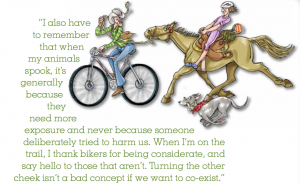 My horse is afraid of bicycles. How do I keep them off the trails? Yours, No Biking
My horse is afraid of bicycles. How do I keep them off the trails? Yours, No Biking
- There should be separate trail systems for each user group.
- Bikes, and every other trail user, have just as much right to use these trails as we do. Deal with it and train your horse better.
- Rather than keep bicyclists off the trails if we work together to coexist we’ll all be better off, and have even more areas to ride.
- If you respect other trail users, you’re more likely to receive it. All groups have rights and responsibilities to the trails and to each other. Be friendly and expect to see folks around every corner.
BUD & GWEN: If you know that your animal has a problem with other user groups, hikers or bikers, then it’s your responsibility to train it or find a more suitable ride. There is not enough land for each user group to have their own trail or enough trail maintenance people or volunteers to care for multiple trails in most areas. It was suggested to us  to hire kids in the neighborhood to ride around your property, paddock or pasture fields and slowly as the horse gets used to the bikes slowly decrease the proximity to the animal. Of course any new surroundings could set up a scary situation for your steed. You need to be mindful that you or your horse should not get hurt in the process.
to hire kids in the neighborhood to ride around your property, paddock or pasture fields and slowly as the horse gets used to the bikes slowly decrease the proximity to the animal. Of course any new surroundings could set up a scary situation for your steed. You need to be mindful that you or your horse should not get hurt in the process.
RFE: I like “D”. Horses and bikes, and hikers, can co-exist. I may be removed from No Biking’s Christmas card list for saying this but in my opinion his horse should be better trained. I’ve ridden with people like No Biking and what I’ve seen is that their fear turns into anger in a hurry. Horse folks that get frightened when their horse spooks sometimes use poor wording expressing themselves in a moment of stress. I can certainly relate to that but I have to also remember that when my animals spook it’s generally because they need more exposure and never because someone deliberately tried to harm us. When I’m on the trail I thank bikers for being considerate, and say hello to those that aren’t. Turning the other cheek isn’t a bad concept if we want to co-exist.
Where is your favorite place to ride? Sincerely, Out There
BUD & GWEN: We would have to say we like being in the woods, in the Mountains or foothills of Pennsylvania or even Montana with some meadows where we can here the birds sing and smell the pine trees and see wildlife occasionally! Along with this kind of area we desire to be on sustainable trails that are safe for our mules and us. Add to that a well-marked trail system so we can be back to our trailer for supper. As we as equestrian work with our local land managers who probably have no equestrian experience what so ever, we can achieve these attributes for our fellow trail buddies and us.
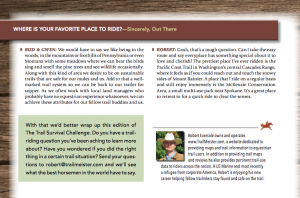 RFE: Gosh, that ‘s a hard question. Can I take the easy route and say everyplace has something special about it to love and cherish? The prettiest place I’ve ever ridden is the Pacific Crest Trail in Washington’s central Cascades Range where it feels as if you could reach out and touch the snowy sides of Mount Rainier. A place that I ride on a regular basis and still enjoy immensely is the McKenzie Conservation Area, a small multi use park near Spokane. It’s a great place to retreat to for a quick ride to clear the senses.
RFE: Gosh, that ‘s a hard question. Can I take the easy route and say everyplace has something special about it to love and cherish? The prettiest place I’ve ever ridden is the Pacific Crest Trail in Washington’s central Cascades Range where it feels as if you could reach out and touch the snowy sides of Mount Rainier. A place that I ride on a regular basis and still enjoy immensely is the McKenzie Conservation Area, a small multi use park near Spokane. It’s a great place to retreat to for a quick ride to clear the senses.
With that we’d better wrap up this edition of The Trail Survival Challenge. Do you have a trail-riding question that you’ve been aching to learn more about? Have you wondered if you did the right thing in a certain trail situation? Send us your questions and we’ll see what the best horsemen in the world have to say.


